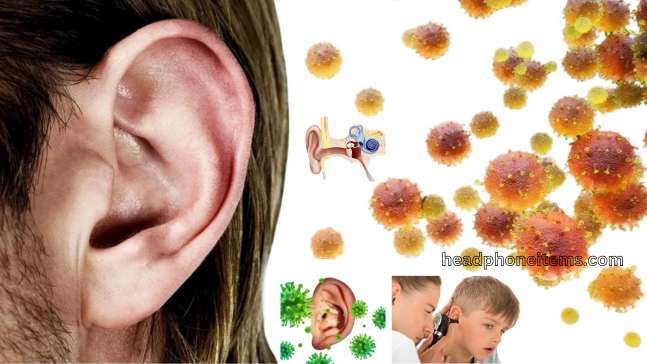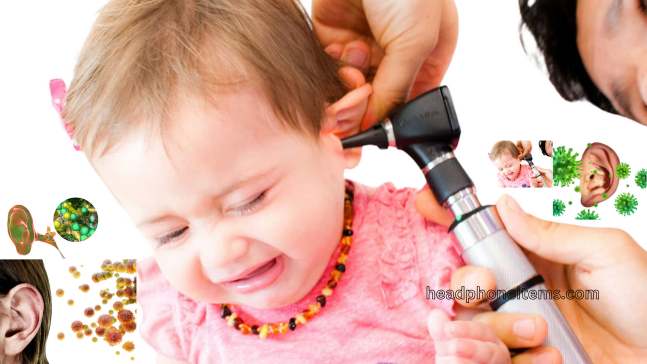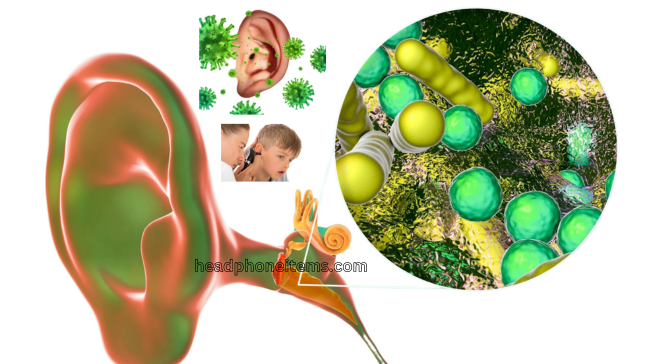Ears ringing from a head cold, or tinnitus, can result from congestion and blockages. This symptom typically subsides as the cold improves.
Head colds cause inflammation and fluid buildup, leading to blockage of the Eustachian tubes that connect the middle ear to the throat. This congestion interferes with normal ear pressure and function, creating that annoying ringing or buzzing sound known as tinnitus.
The Connection Between Head Colds And Tinnitus
This is a common problem, where a simple cold turns into an annoying ringing in the ears. Let’s explore the
Symptoms Of Tinnitus
It rings like a telephone in your ear that doesn’t stop.
There is a buzzing sound as if a bee were trapped inside.
Hiss, which is not from any snake.
The noises can vary from a low roar to a high pitch that no one else can hear. They may come and go or be a constant nuisance. It’s different for each person.
How Colds Cause Ears To Ring
Colds can cause inflammation and fluid in the ear. This is what is happening:
Eustachian tube dysfunction: This tube balances ear pressure. Colds can block it, causing pressure changes.
Ear infections: Sometimes, a cold causes a disease, which adds more pressure and causes ringing.
Think of your ear as a musical instrument.

Immediate Relief Tactics
This uncomfortable sensation, medically known as tinnitus, can aggravate the suffering of a cold. For many, finding immediate relief is a top priority.
Steam Inhalation
- It helps clean the nasal passages, reducing pressure in the ear canals. Here we explain how you can safely perform steam inhalation at home:
- Fill a large container with hot water.
- Add a few drops of eucalyptus oil for additional relief.
- Cover your head with a towel and lean over the bowl.
- Inhale the steam for about 10 minutes.
Warm Compresses
- Applying a warm compress can relieve the discomfort of ringing in the ears. Heat improves blood circulation, which can help reduce the feeling of tinnitus. Follow these steps to use warm compresses:
- Soak a washcloth in warm water.
- Squeeze out excess water.
- Place the warm cloth over the affected ear for 5 to 10 minutes.
- Repeat this process several times a day as needed.
Over-the-counter Solutions
Los zumbidos en los oídos durante un resfriado pueden ser molestos y persistentes. Afortunadamente, los remedios de venta libre ofrecen alivio. Estos tratamientos, disponibles en su farmacia local, pueden ayudar a aliviar el malestar.
Decongestants
Decongestants shrink swollen nasal passages, helping muffle the buzz in your ears.
Pseudoephedrine tablets are powerful decongestants.
Phenylephrine is a milder alternative.
Remember, nasal sprays should be for up to three days.
Antihistamines
- Antihistamines prevent allergies that can make a cold worse. They relieve tinnitus by reducing inflammation.
Pain Relievers
Over-the-counter pain relievers can relieve the pain that accompanies ringing in the ears.
Acetaminophen and ibuprofen are popular choices.
Natural Remedies And Home Care
Ears ringing from a It can be not very pleasant.Natural remedies and home care often provide relief. Simple methods, accessible ingredients, and time-tested practices support healing.
Herbal Infusions
Herbs offer gentle support to your body. They can relieve symptoms of a cold and potentially relieve ear ringing.
Ginger tea reduces inflammation.
Chamomile infusion comforts inflamed tissues.
Echinacea improves your immune response.
Soak these herbs in hot water. Drink the infusion to take advantage of its healing properties.
Hydration
Staying well-hydrated is crucial to recovery. Water thins mucus. This helps clear congestion.
| Fluid Type | Benefit |
| Water | Helps hydrate and detoxify your body. |
| Broth-based soups | Provide nutrients and extra fluid. |
| Herbal teas | Support immune system and soothe. |
Nasal Saline Rinses
Nasal saline rinses Clean the nasal passages. This reduces pressure and ringing in the ears.
Mix 1 teaspoon of salt with half a litre of warm distilled water.
Add a pinch of baking soda.
Use a Neti pot or saline spray bottle.
Gently rinse each nostril.
Rinse daily or as needed to relieve symptoms.

Sometimes, it’s hard to know if this is part of the cold or something to worry about. Ringing in the ears, known as tinnitus, can be a typical cold symptom
Persistent Symptoms
Ear ringing can be short-lived Or it may persist. It’s a sign that something else could happen
If the tinnitus persists even after other cold symptoms have gone away.Sleep or concentration is interrupted by persistent noise in the ears.
Complications To Watch For
Sometimes, ringing in the ears indicates a complication. Watch for these signs:
| Sign | Action Needed |
| Dizziness or balance problems | These could suggest ear infections or other problems. |
| Drainage from the ear | This may indicate an ear infection. |
| High fever | If it is above 102°F, seek medical attention. |
Visit a doctor if complications arise or symptoms persist.
Long-term Prevention Strategies
Long-Term Prevention StrategiesThey play a vital role in managing the Strengthening the body’s defences and reducing exposure to allergens is critical to maintaining ear health and minimizing the chances of recurring ringing. Let’s explore the strategies that can help you achieve this.
Boosting The Immune System
A robust immune system is essential to protect yoursef
- Eat a balanced diet rich in vitamins and antioxidants.
- Get enough sleep, as rest is crucial for immune function.
- Manage stress with activities like yoga or meditation.
Allergen Avoidance Techniques
Allergens It can exacerbate ear-related problems. Use these techniques to keep allergens at bay:
| Environment | Action |
| Home | Use air purifiers and vacuum frequently. |
| Work | Keep your space clean and dust-free. |
| Outdoors | Avoid high pollen areas during peak seasons. |
Myths About Tinnitus And Colds
Myths About Tinnitus and ColdsThey often lead to confusion and misdirection. Sometimes, people believe in quick fixes or miracle cures. We debunk some of these misconceptions.
Ear Candling
Antibiotics For A Cold
| Myth | Truth |
| Ear candles to remove earwax | It is unsafe and not recommended. |
| Antibiotics cure colds and tinnitus. | Ineffective for viral infections and tinnitus. |
Understanding And Managing Tinnitus
Tinnitus It is a condition in which ringing or other noises are heard in one or both ears. The noise is not coming from an external source may ring. Knowing why and how to control tinnitus is key.
Cognitive Behavioral Therapy
Cognitive behavioral therapy, Or CBT is a treatment. CBT can help you manage the stress caused by tinnitus. With CBT, you can change your thoughts about ringing in your ears. You learn to handle noise better. This is what it entails:
- Identify negative thoughts about tinnitus.
- We are challenging these thoughts with the help of a therapist.
- Practice relaxation techniques to relieve anxiety.
Sound Therapy
Sound therapy It uses external noises to help your brain ignore the ringing. Sound therapy may include:
| Sound Source | How it Helps |
| White noise machines | Masks tinnitus sounds |
| Ear-level sound generators | Provides steady sound directly to the ear |
| Customized sound machines | Plays pre-tailored sounds that help distract from tinnitus |
Choosing the right sound therapy will help you feel better.
Future Developments In Tinnitus Treatment
The arena of tinnitus treatment stands on the cusp of revolution. Advances in science promise fresh strategies for those troubled by the persistent ringing that often follows a head cold. People yearn for relief from this intrusive noise. Better understanding and new treatments emerge, offering hope for future reprieve.
Research Updates
Scientific exploration into tinnitus is gaining momentum.Studies are now delving deeper into how the brain processes sounds, improving our understanding of the condition. Researchers examine connections between tinnitus and neural pathways. Their discoveries may unlock new methods for calming ringing in the ears.
- Genetic factors:Scientists are discovering how our genes can influence susceptibility to tinnitus.
- Neuroplasticity: Learning how the brain adapts could lead to interventions that “retrain” auditory processing.
- Biomarkers: Searching for identifiable biological markers helps with early detection and personalized treatment plans.

Emerging Therapies
Innovative therapies are in development to offer new hope.Research results are being translated into practical therapies.
| Therapy Type | How It Works | Development Stage |
| Sound Therapy | Uses external noise to counteract tinnitus perception | Enhancement through personalized sound profiles |
| Drug Therapy | Targets neural circuits involved in tinnitus | Early trials of promising compounds |
| Cognitive Behavioral Therapy (CBT) | Changes the emotional response to tinnitus | Integration with digital platforms for accessibility |
Sound therapies harmonize with the brain’s rhythms.The new devices tailor sounds to the individual’s tinnitus profile. Drug therapies are investigating compounds that could prevent tinnitus from arising after a cold. Cognitive behavioural therapy is evolving. He now uses online tools to reach patients, helping them alter their perception of the doorbell.
The future shines bright for tinnitus sufferers.
Frequently Asked Questions From Head Cold
Can Head Colds Cause Ringing In Ears?
Ear infections or congestion caused by a cold can cause temporary tinnitus, a ringing, ringing, or similar sound in the ears.
How To Alleviate Ear Ringing From A Cold?
To relieve ringing caused by a cold, try decongestants, antihistamines,
Will Cold-induced Tinnitus Go Away?
Tinnitus caused by a cold often decreases as the infection resolves,
Conclusion
Experiencing a ringing sensation in your Remember, it is usually temporary and usually resolves with a cold. For persistent symptoms, seek medical attention. Keep your immune system strong, and consult a professional if you have recurring problems.
Here’s to more precise hearing and better health ahead!

